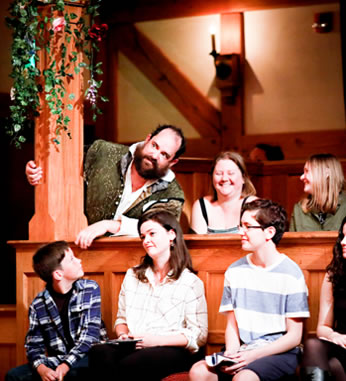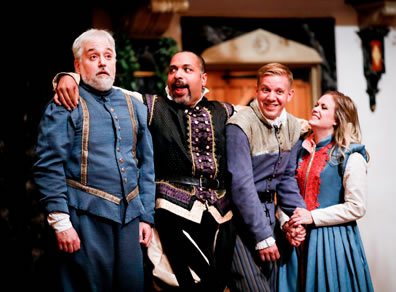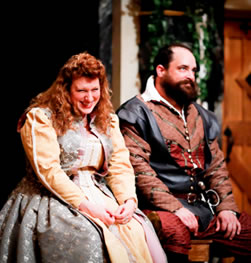Much Ado About Nothing
At the Heart of a Still-Beating Comedy
American Shakespeare Center, Blackfriars Playhouse, Staunton, Virginia
Sunday, September 24, 2017, C–7&8 (front middle stalls)
Directed by Jenny Bennett
 Benedick (David Anthony Lewis, top left) "hiding" in William Shakespeare's Much Ado About Nothing at the Blackfriars Playhouse. Photo by Lindsey Walters, American Shakespeare Center.
Benedick (David Anthony Lewis, top left) "hiding" in William Shakespeare's Much Ado About Nothing at the Blackfriars Playhouse. Photo by Lindsey Walters, American Shakespeare Center.After seeing 18 stagings and two cinematic versions of William Shakespeare's Much Ado About Nothing, I go into the play with a mental checklist, and did so for the American Shakespeare Center's current production at the Blackfriars Playhouse in Staunton, Virginia. Is Claudio's dramatic arc, from smitten soldier to scammed fool to incredible jerk to repentant husband, believable? Check. Does Don John's scam of Don Pedro and Claudio work? Check. Is the gulling of Benedick and Beatrice fun? Check plus. Do we empathize with anybody other than Hero at the miscarried wedding? Leonato, Claudio, and Don Pedro—whoa, triple check. Is the setting apropos to the play's plot and theme? Renaissance, so check.
Beatrice and Benedick aren't on this checklist because there's never been much new to report on them as long as the actors are up to the task, and I figured that was a given with Allison Glenzer and David Anthony Lewis, considering their American Shakespeare Center (ASC) track records. Yet, I was genuinely surprised when these two actors turned in such incredibly fresh takes on the famous couple to make this production a plus-plus-plus staging of Shakespeare's great rom-com.
Director Jenny Bennett, in her third assignment helming a play for the ASC, not only embraces the particular staging conditions of the Blackfriars Playhouse but also brings to her work keen insight into Shakespeare's staging intentions. The Blackfriars is the world's only re-creation of (and named for) Shakespeare's indoor theater in London, and ASC sticks to the original Blackfriars' production conditions: universal lighting, no sets beyond easily portable props, no electronic effects, and the audience in close proximity to the actors, including sitting on stage. Elizabethan and Jacobean theaters did use costumes, and the ASC follows suit with the 16th century Spanish/Italian costumes designed by Jessica Van Essen for this Much Ado About Nothing.
Think about these conditions vis a vis the gulling scenes of Benedick and Beatrice in which those individuals must hide in an orchard while overhearing, respectively, three and two other people. Shakespeare set so many scenes in orchards he must have had a prop representing such a setting: here that prop is a trellis of rose vines. The text clearly states that the gulling characters note where their targets are hiding, so neither Benedick nor Beatrice need be well hidden. In this production, the three men, Prince Don Pedro (René Thornton Jr.), the Count Claudio (Benjamin Reed), and Messina's Governor Leonato (Christopher Seiler) stay in close proximity to Benedick as he moves behind the on-stage audience, slips under a bench (Don Pedro and Claudio sit on the bench), and, at one point, merely holds up a bunch of vines in front of his face. It's all funny, not just to us but to the characters on stage.
This scene generates the production's biggest laugh (applause, even), but the joke gets its textual cue well before the gulling starts when Benedick enters and calls for "Boy!" and Lauren Ballard (who also plays Hero) stomps on bearing a put-upon countenance. Benedick orders him to fetch a particular book and "Bring it hither to me in the orchard." "I am here already, sir," the Boy says, Ballard delivering the line with a tone of "WTF should I fetch your friggin' book when you just called me here?" "I know that," Benedick replies, Lewis astonished at this boy's surly stupidity; "but I would have thee hence, and here again." We laugh and forget about the Boy as, first, Benedick delivers his soliloquy about how he never will marry and then as the gulling scene unfolds. Shakespeare apparently forgot the Boy, too; he never appears again in the text. But why insert this piece of stage business if not for its comic potential? Thus, Bennett brings the Boy back on when Benedick is hiding behind the vine. Ballard's Boy, ever-frowning, sees him and, ignoring Don Pedro, Claudio, and Leonato, chases down Benedick, who tries to scamper away, and shoves the friggin' book into Benedick's hands before stomping off stage. The three gullers and the gulled have to collect themselves before continuing.
These scenes entail much more than physical comedy: they inform the characters of Benedick and Beatrice. "This can be no trick," Benedick says. "The conference was sadly borne." No, it wasn't. But Lewis's Benedick is a pretentious man who maintains a serious contemplation of life, using his wit as a show of his intelligence. Coming to grips with the news that Beatrice loves him, he concludes that he should proceed in courtship because "the world must be peopled"; he must have a grand purpose. But a moment of self-reflecting honesty comes soon after, in a line altered from the original text: "If I don't love her, I am a fool," says Lewis's Benedick. The original has "I am a Jew," meaning lacking Christian charity: updating the text from the original slur maintains Benedick's self-centered moorings while more readily revealing the channel of empathy Lewis will further develop over the course of the play.
Glenzer's Beatrice spends her gulling scene hiding behind the trellis, where we occasionally hear her involuntary reactions to Hero's and Ursula's (Allie Babich) staged gossiping. At one point, Hero and Ursula turn the trellis around so that we see Beatrice reacting to their conversation. As they debate whether to tell her of Benedick's crush, Glenzer's expression turns to one of excited pleading that, yes, she wants them to tell her. Hero, however, notes that "She would mock me into air" and do much worse in putting down Benedick, an observation that strikes Glenzer's Beatrice to the core. In playing Beatrice, Glenzer channels her 10-year-old self: she is whip-smart and displays a wise soul, but she keeps hard hold of child-like merriment. When Don Pedro proposes marriage (perhaps seriously, in Thornton's playing), she responds, without looking at him, "Noooooo," but marks his serious demeanor amid those oooos, shifting into a tone of "ooooh (crap)!" but recovers quickly with "o, my lord, unless I might have another for working-days: your grace is too costly to wear every day. But, I beseech your grace, pardon me: I was born to speak all mirth and no matter."
Glenzer's Beatrice sees Lewis's Benedick for what he is, a man of affectation. They respect each other's wit, for sure, but whatever relationship they had in the past soured on their contrary approaches to life (she, uninhibited fun; he, purposed decorum). Upon being gulled into love, they profess their hearts at the worst possible moment; after the aborted wedding scene when Claudio publicly shames Hero (consequence of a more sinister gulling at the hands of Don John, whom Josh Innerst, wearing all black, plays as a simple "plain-dealing villain"). Beatrice wants to make Claudio accountable, but she will not say this to Benedick. "It is a man's office, but not yours," she says, Glenzer indicating she doesn't want to put him in danger. He takes her meaning as demeaning him, so he professes his love for her. She reciprocates, and as they get caught up in the enthusiasm of their newly discovered passion, she makes the request: "Kill Claudio." In this play's stage history, the audiences' reaction to this moment—laugh or gasp, and how to achieve either desired affect—has been debated among actresses who've played the part (and, for Judi Dench, who also directed the part). Glenzer achieves something I've never seen nor heard reported: she gets both gasps and nervous laughter. Lewis's Benedick apparently thinks she's being foolish. "Not for the wide world," he says in schoolmaster tone. She's not joking, though, and lets loose her tirade. He, taken aback, listens—and Lewis listens closely to the ranting but intelligent observer of custom and truth that is this Beatrice. He finally stops her and takes up her cause with such a serious constitution—not as merely romantic gesture—that it makes her see him in a new light, appreciating what his decorum is all about.
In their wonderful courtship scene after he has challenged Claudio, Lewis's Benedick strips himself of his facade, and Glenzer's Beatrice comes to fully respect his true heart. They sit side by side on a bench, talking, holding hands, enjoying honesty and the intelligence of the other. Still, it's inevitable that they engage in one more moment of resistant combat when they must publicly profess their loves; but that's a slight blip in their journey as their draft love letters to each other are revealed (Glenzer's face reading Benedick's letter is precious, her eye-popping expression indicating his poem must be even worse than he insinuates when drafting it). Glenzer and Lewis as Beatrice and Benedick become the happiest of couples Shakespeare ever created.
For all his great moments with Glenzer and in his gulling scene, Lewis's key delivery comes after Claudio sends his wedding to Hero off the rails and Benedick comments "This looks not like a nuptial." Lewis maintains Benedick's serious demeanor in speaking it, but his timing, bookended by a mere subsecond of silence, lands the line with such comic power it earns a hearty laugh, reminding us that, no matter what we are watching now or about to see (Hero fainting), this is a comedy.
Bennett keeps a steady rein on the play's twin courses, comic and dramatic, through such textual clues and the cast's development of individual characters. Reed doesn't seek out any pathology or personality disorder in Claudio's makeup, but his entire dramatic arc is believable as the actor, channeling the temperament of a young man recently "bestowed [with] much honor" in war, puts full faith in the lines Shakespeare gives him. He and Don Pedro are not easily gulled by Don John: rather, Don John and Borachio (Greg Brostrom) are thoroughly convincing in the way they carry off their scam (in part because, true to Shakespeare's text, it occurs off stage). Both Reed and Thornton play their parts not along the lines of what the audience knows but what Claudio and Don Pedro have experienced, what they think is certain truth, and what they believe is honorable.
After bearing their accusations, Hero hyperventilates, leading to her fainting, whereupon Leonato goes on his cruel tirade about his spotted daughter. This, too, is the experiential portrayal of Hero's father, whose high hopes and regard for his only child are dashed in an already emotionally charged moment. Meanwhile, from Claudio's first shaming Hero through Leonato's lament, Friar Francis (Brostrom) keeps close watch on Hero, "noting of the lady." When Brostrom's Friar speaks this line, he emphasizes the word noting not only to chastise Leonato but as a social lesson to us all: judgement should not be determined without first noting the lady. The productions of this play I've seen tend to pigeonhole Leonato into one of three personas: the congenial wealthy host in the first third, the single-minded anguished father in the second third, and the vengeful hothead in the final third. Seiler plays these episodes as phases in a continuum.
Furthermore, his brother Antonio (Tim Sailer) paints a big piece of Leonato's picture in relief. In the postwedding scene in which first Leonato and then Antonio accost Claudio and Don Pedro, Antonio uses his cane as if it were a sword, stabbing and swiping at Claudio, who has to maneuver out of the way (fight direction by Patrick Earl). Seiler's Leonato switches from anger at Claudio to real concern as he tries to calm Antonio. We quickly learn why as Antonio suddenly draws a sword out of his cane. Sailer's presentation of Antonio is relentless in this scene, a generally quiet old soul suddenly unsheathing as a man of violent temperament, and the ultimate impact is to shake both Claudio and Don Pedro. They are not quite so carefree as they address Benedick when he walks on stage immediately afterward.


Above, from left, Leonato (Christopher Seiler), Don Pedro (René Thornton Jr.), Claudio (Benjamin Reed), and Hero (Lauren Ballard) plot to gull Beatrice (Allison Glenzer) and Benedick (David Anthony Lewis), who fall for the ruse and, subsequently, in love (left) in Much Ado About Nothing at the Blackfriars Playhouse. Photos by Lindsey Walters, American Shakespeare Center.
The manner in which these successive moments are staged illustrate just how effectively Don John has blinded Don Pedro and Claudio. At first the "old men" are mere inconveniences to the prince and count, no threat to their honor, let alone their lives. Then they learn from Leonato (confirmed by Antonio) that Hero died upon Claudio's slander, and before that can sink in, Antonio reveals he is a threat to their lives. Benedick follows with promise of more real danger, at least to Claudio, while informing Don Pedro he can no longer serve him. Then he delivers the news that not only is Hero dead, but that Don John has stolen away. As soon as this news sinks in for Don Pedro, on comes Dogberry (Chris Johnston) with the prisoners, Borachio and Conrad (Babich). Johnstone's oblivious Dogberry—who, after Conrad calls him "an ass" ("Oooohhhh!" the audience reacts) then urges the audience to likewise call him an ass—provides immediate comic relief. At the same time, however, this exact moment represents the depth of tragedy for Don Pedro and Claudio as they learn the full truth of Don John's villainy. But this does not exonerate them, for back comes Leonato to look in the eyes of the villain, and though Borachio steps forward, Leonato turns to the men he intends, Don Pedro and Claudio.
Their path to full fault is now complete as Claudio accepts his responsibility and, rather than ask for forgiveness, asks for atonement at the hands of Leonato. What happens next I've never seen before, despite the historical custom the text indicates: "To satisfy this good old man, I would bend under any heavy weight that he'll enjoin me to," Don Pedro says, and Thornton bows to Leonato. A prince bowing is the highest sign of humility for a royal, and the others on stage immediately bow, as well.
That Leonato offers to marry off his niece, Antonio's supposed daughter, as Claudio's atonement is played here as a "huh?" moment (even for Sailer's Antonio, though he quickly grasps Leonato's purpose). This is the one plot turn that hasn't stood the test of our times very well, but such is the tone Bennett has established to this point that the audience accepts Leonato's ridiculous "punishment" as part of the play's comic nature and the necessary final stage in Claudio's redemption. Many productions these days have Hero watching Claudio's obsequies at the family crypt, though Shakespeare doesn't put her on stage in that scene. Bennett follows this trend, but gives it some textual fealty: before Claudio arrives at the crypt, Friar Frances leads Hero in, has her lie down and shrouds her. Claudio does his obsequies to the actual Hero, not a stone tomb, and even kisses her, though not lingering enough to feel her warmth.
It's quite a journey these characters have charted through this pleasurable comedy with its speed bumps along the way. Then, when Benedick orders a dance at the end, the cast breaks into Madonna's "Express Yourself." This is our journey, too.
Eric Minton
October 3, 2017
Comment: e-mail editorial@shakespeareances.com.
Start a discussion in the Bardroom



 Find additional Shakespeareances
Find additional Shakespeareances